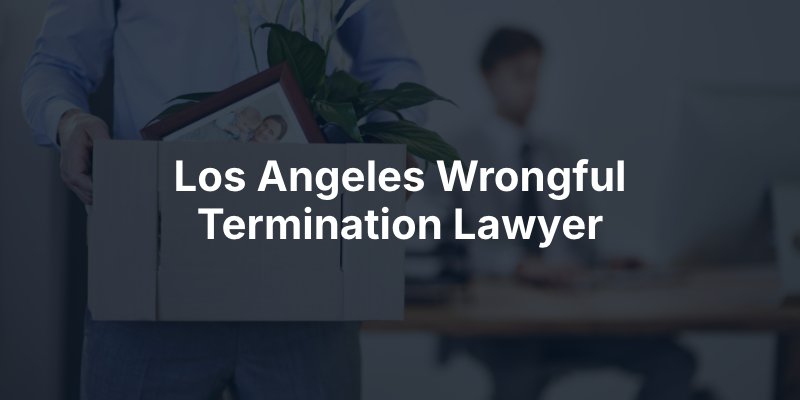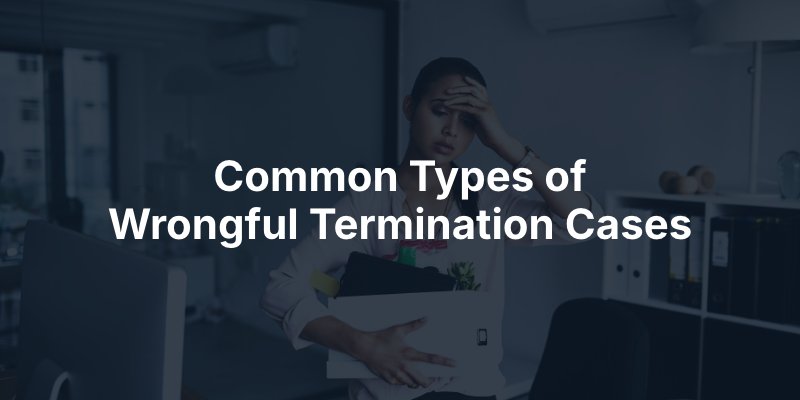If you have been wrongfully terminated or forced to resign because of unfair treatment in the workplace, you should speak with an experienced Los Angeles wrongful termination lawyer about your rights and legal options. Aegis Law Firm can help you.
If you feel that you have been wrongfully terminated at work, or forced to resign, our Los Angeles wrongful termination attorneys can evaluate your case and determine if you have a valid claim. Your initial consultation is free, and we offer Spanish-speaking services. Call our Los Angeles employment law attorneys today at, (949) 379-6250 to schedule your free consultation and assessment of your case.

The employer-employee relationship involves a level of free choice for the parties involved. Employers have the freedom to hire or terminate an employee as it suits their business. Employees also have a right to leave a workplace that no longer meets their needs. However, the law protects employees from termination for unlawful reasons, and unlawful adverse employer actions that force an employee to resign. An employee who has been wrongfully terminated may be entitled to legal remedies including recovery of past and future lost wages and benefits, and damages for emotional distress.
Certain employment actions are prohibited for public policy reasons, which could be for the protection of a class of persons in society based on disability, pregnancy, gender, sexual orientation, age, or religion. Other public policy reasons could be based on an employee’s refusal to engage in unlawful actions at the direction of their employer. When an employee is terminated for an unlawful reason in violation of federal and state laws, or in breach of their employment agreement, they may have a valid wrongful termination claim.
Common grounds for wrongful termination claims in Los Angeles include the following:
Employers cannot fire employees based on protected characteristics such as race, gender, religion, age (over 40), disability, sexual orientation, or pregnancy
Firing an employee for exercising their legal rights, such as reporting sexual harassment, discrimination, or unsafe working conditions, is prohibited.
If an employment contract specifies conditions for termination, firing an employee outside those conditions violates the agreement. Also known as breach of contract.
Employees cannot be fired for reasons that go against public policy, such as refusing to engage in illegal activities, serving on a jury, or taking legally protected leaves.
In addition to federal laws, California has a long list of state labor laws and regulations codes that protect workers from wrongful termination. Workers in California enjoy extensive protections under these laws:
Prohibits an employer from retaliating against an employee for asserting their rights as a member of a protected class. Protected employees fall into different categories including age (40 years or older), disability, pregnancy, religion, sex, gender identity, sexual orientation, medical condition, marital status, and veteran status.
This code prohibits an employer from retaliating against or terminating an employee who discusses or makes a report about the employer’s work conditions.
Prohibits the termination of an employee who has exercised their right to use their sick leave.
Prohibits the termination of an employee who refuses to work more hours than permitted by the State’s Industrial Welfare Commission.
Federal laws such as the Family Medical Leave Act (FMLA), the Americans with Disabilities Act (ADA), and Title VII of the Civil Rights Act, all provide protections for workers who are terminated because they belong to a class of persons protected against discrimination in the workplace. While federal laws typically apply to businesses with 25 or more employees, California state employment laws apply to businesses with five or more employees, providing protection for a wider number of workers in California.
It can sometimes be challenging to identify wrongful termination, but these signs may indicate illegal practices:
In cases of wrongful termination in Los Angeles, individuals may be entitled to various forms of compensation depending on the circumstances of their dismissal. Common types of compensation include:
According to the U.S. Equal Employment Opportunity Commission (EEOC), employees who believe they have been wrongfully terminated due to discrimination can file a complaint and may seek remedies through mediation, litigation, or settlements (EEOC, 2023).
If you believe you have been wrongfully terminated in Los Angeles, it is essential to know your rights and the legal protections available:
You have the right to report your wrongful termination to government agencies, such as:
Filing a complaint with these agencies is often the first step toward pursuing a legal claim.
If you were wrongfully terminated, you may be entitled to several types of compensation, including:
You have the right to seek legal representation to help you determine your legal options and pursue a claim.

Under California law, it is illegal to fire an employee based on protected characteristics, including race, gender, pregnancy, disability, age (over 40), sexual orientation, religion, or national origin.
Example: An employer fires a female employee after learning she is pregnant, citing concerns about her ability to perform her job, despite no evidence of poor performance. This violates pregnancy discrimination laws under FEHA.
Employers cannot retaliate against employees who assert their legal rights or report illegal or unethical conduct. Retaliation often involves termination after an employee files a complaint or engages in protected activities.
Example: An employee files a harassment complaint against their supervisor. A month later, they are terminated for “poor performance,” despite consistent positive evaluations before the complaint.
While California is an at-will employment state, employees with written or implied contracts may not be terminated in violation of the agreement.
Example: An employer fires an employee who has a written contract guaranteeing a one-year term of employment without cause, breaching the agreement.
Employers cannot terminate employees for reasons that violate public policy, such as refusing to engage in illegal activities or exercising their civic rights.
Example: An employee is fired after refusing to falsify financial reports at the request of their supervisor. This constitutes a violation of public policy, as the employee refused to participate in illegal activity.
California law protects employees who take legally entitled leave, such as under the California Family Rights Act (CFRA), Family and Medical Leave Act (FMLA), or Pregnancy Disability Leave (PDL).
Example: An employee takes leave to care for their newborn under CFRA. When they return, their employer informs them their position has been eliminated, despite no legitimate business justification.
California’s whistleblower laws protect employees who report illegal activities or violations of public safety laws from retaliation, including termination.
Example: An employee reports unsafe working conditions to the Occupational Safety and Health Administration (OSHA). Shortly afterward, the employer fires the employee, claiming “budget cuts” as the reason.
Constructive discharge occurs when an employer makes working conditions so intolerable that an employee feels forced to resign. This is treated as wrongful termination if the employer’s actions violate the law.
Example: An employee faces constant harassment after requesting accommodations for a disability. The employer ignores their complaints, and the employee resigns due to the hostile work environment.
Firing an employee for filing a workers’ compensation claim or reporting an injury violates California law.
Example: An employee sustains a back injury on the job and files a workers’ compensation claim. Shortly after, the employer terminates them, falsely citing “restructuring.”
The employer-employee relationship is usually defined by an employment agreement, providing for the terms of the employment – how much an employee will be paid, what benefits they are entitled to, any limitations or restrictions on the employee, the employer’s responsibilities, and other important terms of the relationship. An employment contract may be for a fixed term, for example, a person may be employed for a renewable or non-renewable term of two years. On the other hand, where there is no specified term and the employment can be terminated by either the employer or the employee on notice, it is an at-will employment.
In California, all employment is presumed to be at-will. This means that an employer can terminate an employee for no reason at all, or for even an unfair reason, as long as the termination is not based on retaliation or discrimination. It does not matter whether the decision to terminate was a good, bad, or mistaken decision, an employer has the right to terminate an employee. What matters is whether the termination was discriminatory or retaliatory.
To succeed in a claim for wrongful termination, an employee must prove the following:
An employee must be able to show evidence to prove their case. The best way to pursue a wrongful termination case is to have the support of an experienced wrongful termination attorney who can help you navigate the law and meet your evidentiary burden to prove your case.
Sometimes, an employer may not outright terminate an employee, but they intentionally create a hostile working environment, which causes the employee to resign. This is referred to as a constructive termination. When an employee is constructively terminated in violation of the law, they may also be entitled to legal remedies if they suffered harm and the hostile working environment was the substantial factor in causing the harm suffered.
A wrongful termination attorney can play a critical role in securing justice and compensation for your case by:
Evaluating Your Case
Determining if your termination violated laws and assessing the strength of your claim based on the circumstances and evidence.
Gathering Evidence
Collecting key documents such as emails, employment contracts, and performance reviews. Interviewing witnesses and building a compelling case to support your claim.
Handling Legal Processes
Filing complaints with the CRD or EEOC and navigating complex legal procedures to ensure compliance with deadlines and requirements.
Negotiating Settlements
Engaging with your employer to secure a fair settlement, including compensation for lost wages, emotional distress, and punitive damages.
Representation in Court
Advocating for you in court if a settlement cannot be reached, presenting a strong argument to maximize your compensation and hold your employer accountable.
Providing Protection
Safeguarding you from employer retaliation or intimidation during the process and ensuring your rights are upheld at every stage of your case.
Hiring a skilled attorney greatly improves your chances of a favorable outcome, allowing you to focus on your future while they handle your case.
Employers are aware of the laws prohibiting wrongful termination and will try to disguise it as a lawful termination. The best way to determine whether you have a claim is to contact an experienced Los Angeles wrongful termination attorney. The team at Aegis Law Firm has the experience and will fight for you with passion. If you believe you have been wrongfully terminated, contact Aegis Law Firm to find out how we can help you. Call us at (949) 379-6250 for a free evaluation of your case.